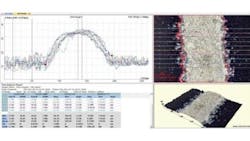Solar Industry Takes a Microscopic Look at Quality to Improve Efficiency and Bring Down Costs
To meet today's intense pricing pressure, solar cell manufacturers have slimmed their cells down to mere microns to save on material costs.
Now, as pressure continues to mount, they are finding that they have no silicone left to cut, and so they have turned instead to their manufacturing processes to find new ways to increase efficiency and bring these production costs down just a little more.
In the solar industry, this means quality assurance measures in the printing of contact lines -- the most expensive and critical element of the process.
A recent partnership between Germany's ASYS Automation Systems and Zeta Instruments highlights this growing trend.
ASYS & Zeta Instruments
In this partnership, ASYS -- a global supplier of screen printers used to apply these metal contact lines -- will begin incorporating the Zeta microscope system to obtain rapid 3D imaging of its printers' lines without contacting or damaging them in the process.
This system will help guarantee quality by detecting any fault or microscopic imperfection that may affect overall performance of a solar installation. This guarantee is essential for helping companies meet their cost effective goals, explained Vamsi Veldandla, vice president of marketing at Zeta.
"The entire efficiency of the panel is limited by the weakest link," he said. "If one vapor is out of spec ... then it restricts the entire module. So people have started putting in more production and quality control checks."
"If a company like ASYS wants to supply equipment to the industry, their equipment has to meet certain specs, even before it is installed." With Zeta monitoring quality, he said, "ASYS is qualified to create a certain contact line geometry based on the results. That gives them an edge on their competition who cannot prove the quality of their contact line printing process."
Stakes in this department are higher than anywhere else in the manufacturing process, Veldandla said. Saving money on contact lines and proving efficiency can translate into significant costs savings.
"The contact lines are made of metal and some of them are really expensive," he said. "Almost 40% of the cost [of a solar cell] might be going into these metals."
To fight these costs, manufacturers thin their lines out as much as possible, just as they have with the cells. However, this creates a difficult balance to maintain.
"You don't want the contact line to be too thick, because it's a waste of metal," said Veldandla. "But you don't want it to be too thin either because then sometimes you get shorts or breaks in the line."
To resolve this, he said, more companies are turning to equipment suppliers like Zeta to help guarantee quality all across the product.
"We did a study with applied materials and we found there is a certain optimum set of parameters which give you the best texture when etching the vapors," he said. By using its system to verify specs, he said, companies can now "focus on creating better lines, better contacts, cleaner lines. Control the measurement of printing better. That's why people are buying equipment like ours, which is helping them improve their profits."
About the Author
Travis M. Hessman
Editor-in-Chief
Travis Hessman is the editor-in-chief and senior content director for IndustryWeek and New Equipment Digest. He began his career as an intern at IndustryWeek in 2001 and later served as IW's technology and innovation editor. Today, he combines his experience as an educator, a writer, and a journalist to help address some of the most significant challenges in the manufacturing industry, with a particular focus on leadership, training, and the technologies of smart manufacturing.
